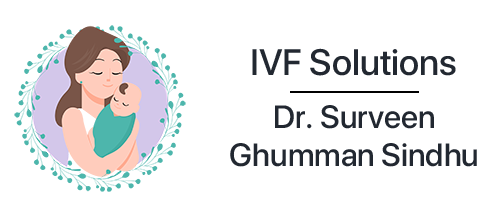Invitro Fertilization (IVF)
This is the most common treatment to deal with couples who have failed to conceive naturally.
Get Free Consultation
Explanation
The technique of IVF consists of bringing about the fusion of the egg and the sperm outside the body in the laboratory. IVF involves the taking injections to form and mature multiple eggs in one menstrual cycle of a woman. These once fertilized (fused) with the sperm will yield many embryos. The more the number of embryos, the higher the chances that a pregnancy will occur since all embryos will not grow and implant in the womb to grow into a live baby. Only some will. Hence, it is important to have many eggs unlike in a natural cycle where only one egg reaches maturity.
Where couple is infertile
- Blocked or absent fallopian tubes
Endometriosis - Irregular ovulation as in PCOS
- Low sperm count or motility
- Absent sperms (Azoospermia)
- Unexplained Infertility
- Multiple failed attempts at IUI
- Decreased egg reserve/early menopause ( Need for donor egg)
- Inability to go through a term pregnancy- Scarred /absent uterus (Need for Surrogacy)
Where Couple is not infertile
- Genetic disorders(Requiring PGD)
- Recurrent miscarriage (Requiring PGS)
- Before Cancer chemotherapy to preserve eggs/embryos as there will be irreversible damage to ovaries
- One partner is HIV or Hepatitis B & C positive to avoid infection in other partner
Did You Know?
By the end of this century, IVF might account for 4% of the global population i.e. about 400 million babies.
Steps in IVF Treatment
Stimulation of the Ovaries
A series of daily injections of a hormone called FSH is given to stimulate the ovaries to produce more than the usual one egg per cycle.
Prevention of Premature Ovulation
This is achieved by an injection which shuts down communication between the brain and the ovaries to gain control of the ovulation day so that the eggs are not released before they can be collected.
Triggering Ovulation
An injection is given to trigger the final maturation of egg before collection of egg. This maturation is important as sperm can only fertilize a mature egg
Collection
The eggs and sperm are collected for fertilization 34-36 hours after the trigger injection. Egg collection done under short general anesthesia through the vagina by passing a needle under ultrasound guidance
Culturing
The eggs are sorted in the laboratory. The mature ones are selected and placed with the sperm in a plastic container. They are checked for fertilization next day and for progress till day 5
Assisted Hatching
Assisted hatching is a newer lab technique that was developed when fertility experts observed that embryos with a thin zona pellucida had a higher rate of implantation in uterus. With assisted hatching, an embryologist uses a laser under a microscope to create a small hole in the zona pellucida.
Transfer
The embryos are transferred through the cervix and into the uterus on Day 3 or 5 of culture by a thin tube. If more embryos are created than are required for transfer, the strong healthy ones may be put in cryo-storage (frozen) for transfer at a later date if required.
Support Medicines
Medicines to support the pregnancy if occurs are given for 14 days
Pregnancy Test
Blood test to confirm pregnancy is done after 12-14 days of transfer depending on whether transfer was done on day 3 or day 5 of culture.
Why Surveen Ghumman Sindhu?
Our Success Story
My wife and I traveled to India from the USA for infertility treatment. We visited some hospitals in Delhi after coming to India, and the doctors said we cannot have our own children. I started searching for more successful, experienced which led me to doctor Surveen Ghumman Sindhu.
My wife and I traveled to India from the USA for infertility treatment. We visited some hospitals in Delhi after coming to India, and the doctors said we cannot have our own children. I started searching for more successful, experienced which led me to doctor Surveen Ghumman Sindhu.
The first day when we engaged in the discussion about treatment, her knowledge about IVF, experience and more importantly the SELF-CONFIDENCE changed our idea about leaving India. My wife started IVF under Dr. Sindhu’s treatment, Dr. Sindhu’s team were professional, patient, humble and more importantly self-confident.
Dr. Sindhu used the best medications of the world for my wife’s treatment, she tried her best and we got charged reasonably. She did her work perfectly.
My wife got pregnant at first try, and we have a lovely child now.
Definitely, I would recommend Dr. Sindhu and her team for anyone who is seeking IVF treatment in India.
Fresco & Asif, USA
We went to many IVF doctors in Delhi. Finally, Dr Surveen Ghumman Sindhu treated us and we are now blessed with a baby. Ours was a difficult case with low AMH. However her injection protocol and additional drugs she gave were so effective that we got 9 eggs.
We went to many IVF doctors in Delhi. Finally, Dr Surveen Ghumman Sindhu treated us and we are now blessed with a baby. Ours was a difficult case with low AMH. However her injection protocol and additional drugs she gave were so effective that we got 9 eggs. The lab at max is of high quality as the result was all fertilized and we got 6 blastocysts.
During this journey Dr Surveen was always supportive and approachable. She would always be positive and that is what got us through this treatment. Her expertise in low ovarian reserve and low AMH was evident in the outcome of our treatment. She is the best IVF doctor in Delhi.
We had a wonderful and positive experience of having a donor egg IVF treatment with Dr Surveen. Coming from the UK, we had a lot of insecurities of getting the process done in India but working with Dr Surveen reassured in every way that we are in good trustable hands esp.
We had a wonderful and positive experience of having a donor egg IVF treatment with Dr Surveen. Coming from the UK, we had a lot of insecurities of getting the process done in India but working with Dr Surveen reassured in every way that we are in good trustable hands esp. in finding the suitable donor we would completely trust Dr. Surveen’s sincere efforts to find us appropriate and healthy donor.
During our treatment, we were referred to best doctors for special consultation on expert areas including reference to the best possible obstetrician for after 3 months pregnancy care. We always felt in safe and trustworthy hands wherever we were sent by Dr Surveen.
We will recommended Dr Surveen to anyone coming from abroad who need a person to trust and depend on in a foreign land
Some Priceless Happiness
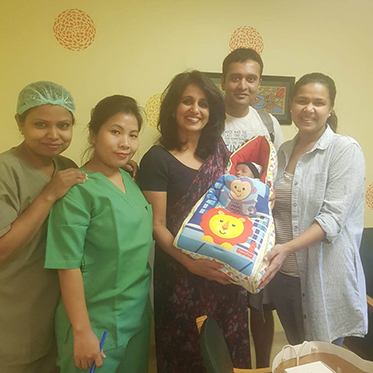
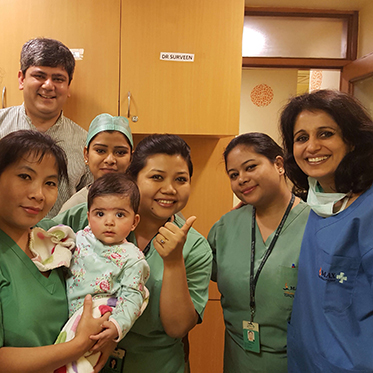
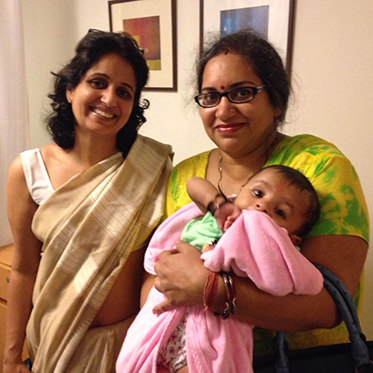
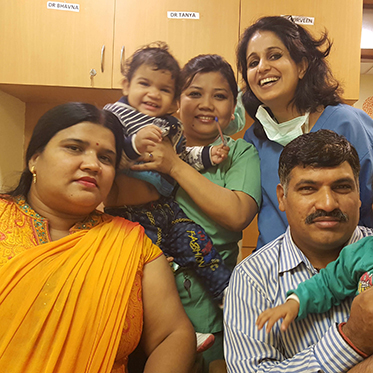
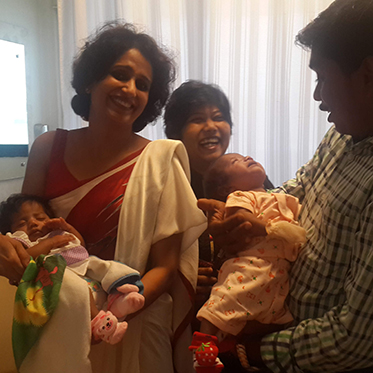
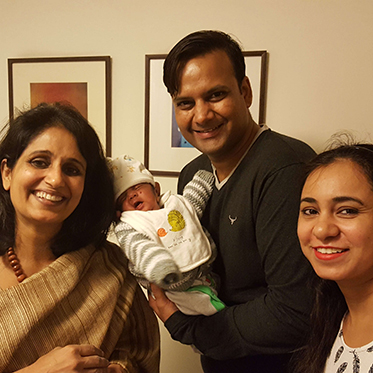
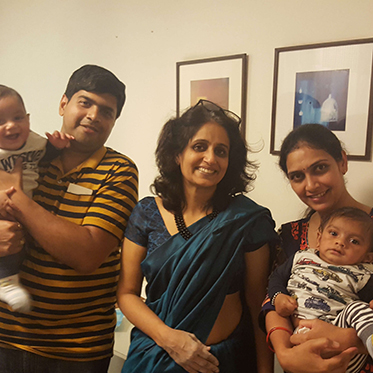
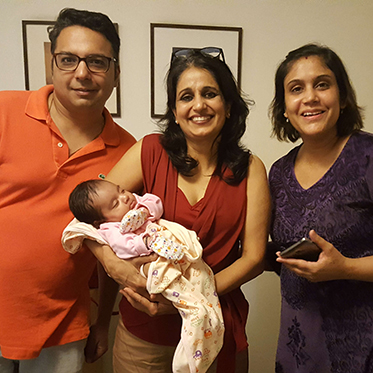
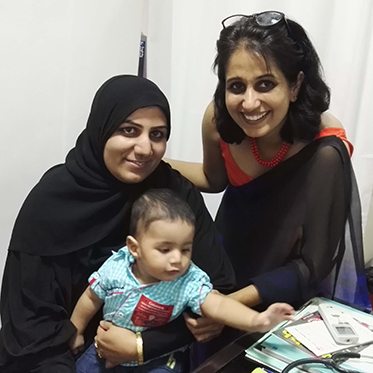
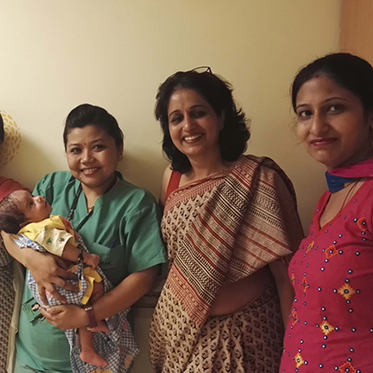
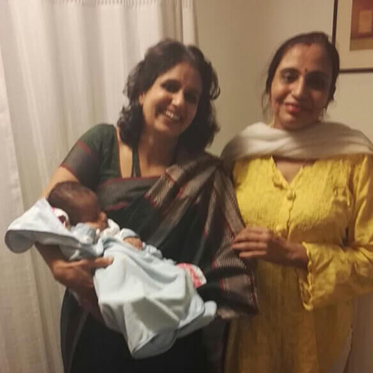
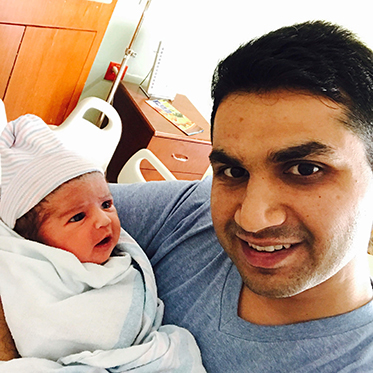
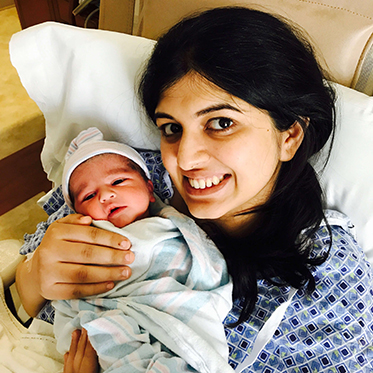
Frequently Asked Questions
Day one of your cycle is considered your first day of full flow menstrual bleeding, not spotting. If this occurs after 2 p.m., the next day is considered day one.
This will depend on your individual response to the medications. During an IVF cycle at our clinic, you will have between four to six appointments, including one for the egg retrieval. We do not encourage unnecessary travel to the clinic. However, this varies from patient to patient and also with the stage of treatment. During these visits egg and endometrial development are checked. Some blood tests may be advised to assess egg maturity and decide on the drug dosage.
No, not generally. It lasts approximately 15 to 20 minutes, and general anaesthesia is given. Some patients have mild cramping after the procedure and are discharged with a prescription for pain medication.
No. Children born from IVF are no more inclined to any particular birth defect than those conceived naturally.
We find that most couples will get pregnant within 2 tries. Occasionally, there may be a reason to do a third attempt but that is not common. More than this may be tried if the couple is keen.
It can take up to 6 weeks for inflammation to resolve; therefore, it is reasonable to wait a similar amount of time before restarting the process

